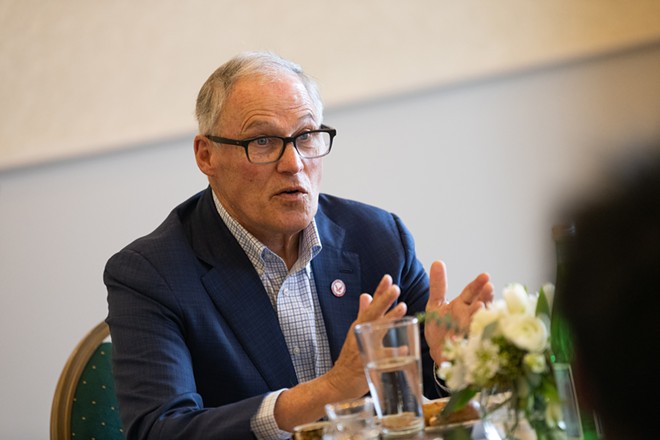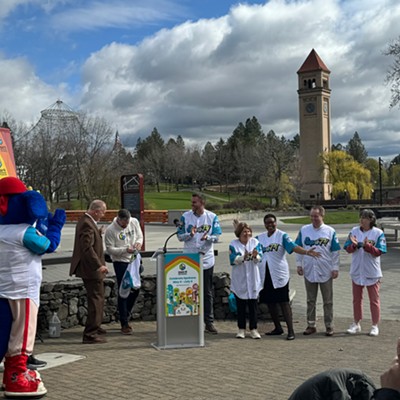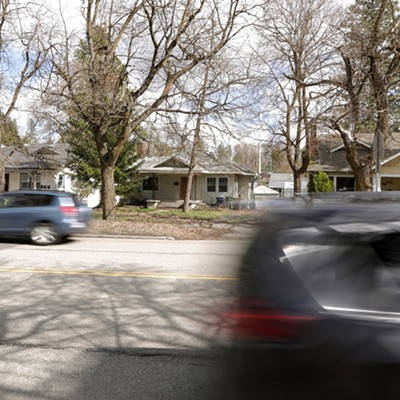The conservative critics were wrong about Jay Inslee.
They warned that the governor's left-wing, environmental policies — coupled with Washington state's ever-rising minimum wage — could strangle the state's business climate.
That didn't happen.
Instead, Washington's economy has continued to boom, and the total per capita value of all the state's industry is the third-highest in the nation.
And so, with that lens, having served under Inslee — as the director of the Commerce Department — looks like an unbeatable resume for someone who wants to be mayor of Spokane.
Inslee agrees: Lisa Brown helped make Washington state the business hub it is today.
"We have been listed repeatedly as one of the top three or five places to do business in the United States, and her leadership has been a significant part of that," Inslee says of Brown. "She's helped grow the economy of the state of Washington."
But there's a problem: A study commissioned by the state's Democratic lieutenant governor last year found that Washington, by one metric, had the least amount of housing available for its population than any other state in the nation. And when there's not enough housing, people start to slip through the cracks.
In other words, across Washington's cities, business is booming while people live and die in the streets.
Brown acknowledged the problem in her campaign launch speech, tying a dramatic decrease in rental vacancy rates, and rising rent and home prices, to Spokane's increased homelessness.
All you have to do is to look to the East Central neighborhood, where Camp Hope stands as a visible reminder of Spokane and Washington state's failure to stem the surge in homelessness. At its peak this summer, the encampment was the largest in the state, and arguably the nation — more than 600 people packed into rows of tents and RVs on a single block of land owned by one of America's most prosperous states.
If the camp, and homelessness in general, is a political weakness for Brown, the same goes for the person she's seeking to defeat, Mayor Nadine Woodward. Woodward can be blamed for not providing enough shelter space soon enough to prevent Camp Hope's population from exploding last summer. And Brown can be blamed for spending millions of state commerce dollars on a plan that prolonged the camp's existence and failed to house a majority of its residents.
But in their efforts to solve the problem, both start severely handicapped by the decades of leaders who got Washington state in a housing crisis to begin with.
SPRAWL, Y'ALL
Inslee knows Washington is seriously struggling with housing, but he blames the market.
"The private sector is not building housing for teachers who can't afford to rent," Inslee said last week during a visit to Spokane. "It's not building housing for people who work in early childhood education centers that can't afford rent. We need that public investment."
He says he's asking the Legislature to spend $4 billion to build housing and help address homelessness.
And yet, Inslee has been governor for a decade — though until 2018 Republicans controlled the Senate. During his tenure a lot of people warned about the looming housing crisis.
"I can say that over the last 10 to 14 years, there have been some very loud voices, mine included, saying, 'Wake up, there's an issue here, we need to change course,'" says Spokane City Council member Michael Cathcart, who was elected in 2019.
Brown heard it, too. But she says that for years, there was a strong sense throughout the state that land use policy, like zoning, was a local issue, not a state issue.
"That just didn't add up to enough housing statewide," Brown says.
Does Inslee share some blame for that?
"I think you can always say, why didn't we sound the alarm sooner?" Brown says. "You can hand that to the Legislature, you can hand that to local electeds. Even advocacy organizations."
But Inslee himself bristles at the notion he bears part of the blame — he sees the housing crisis as a natural consequence of the state's success.
"We're not the only state with a housing crisis. We've had a million people move here, because we're so successful as a state," Inslee says. "We've only built about 340,000 housing units. We need to accelerate this dramatically."
And yet, when conservatives look at places like California, Oregon and Washington — with their interwoven crises of homelessness and housing — they see a failure of liberal policies.
When Spokane leaders were searching for a model for combatting homelessness, they went to Houston to try to copy their strategy. But beyond the specific strategies of the relatively liberal metropolis, Houston's no-official-zoning land use policies have been shaped by conservative Texas politics.
Inslee's not a fan of Texas.
"Texas — they've decided to destroy their state by having built everything across the state with no central planning," he says. "They're not protecting their environment. They're not building the economy like we do."
Flying into Dallas, you can see the consequences of that lack of planning: Dallas, Fort Worth, Arlington, Plano. The equivalent of the entire population of Washington is sprawled over one giant metropolitan area. It's the sort of suburban monstrosity that Washington state sought to avoid with the Growth Management Area, created in 1990.
And yet, Texas has fewer homeless people, even though its population is nearly four times the size of Washington's.
"It's because they don't have as many people moving [there] as we do," Inslee says.
But that's not true. In fact, for every one of the last three decades, Texas's population has grown at a faster rate than Washington's. Still, the median house price in Washington is about twice that of Texas. In 2021, Texas had nearly twice as much vacant rental housing as Washington did.
To state Rep. Andy Barkis, R-Olympia, Texas shows the conservative approach to housing works.
"It's truly fundamental. It's, 'Get out of the way. Government is not the solution,'" says Barkis. "They are encouraging, they are not discouraging, they are not impeding."
To be sure, Inslee supports a wide range of measures that make it easier to build housing, like the bill to make it legal to construct anything up to a fourplex in any city's residential zone. He supports density.
But when it comes down to it, Barkis says, Inslee shows his priorities: the environment and government-funded affordable housing.
"He continues to promote a single-minded climate policy," Barkis says, pointing to efforts to limit the use of natural gas heating in certain types of new home construction or to add climate change goals to the Growth Management Act.
"His answer is to let's just keep throwing money into the housing trust fund," Barkis says. "And let's just spend billions of dollars to build affordable housing via the public dollar."
"We're not the only state with a housing crisis. We've had a million people move here ... We've only built about 340,000 housing units."
tweet this
HOUSELESS PRICES
"We need to do this now," Inslee said while pitching his $4 billion housing and homelessness proposal earlier this year. "It's not acceptable for the next 20 or 30 years to have this squalor as a blight on the state of Washington."
"Squalor" is Inslee's preferred word when talking about Washington's homeless encampments. Most recently, he used the word to describe Camp Hope, which has sat on land owned by the Washington State Department of Transportation for 15 months.
In spring last year, the Legislature funded Inslee's $143 million Rights-of-Way initiative in order to clean up state-owned highway properties like Camp Hope. The right-of-way initiative is focused on moving the homeless campers into housing, not just sticking them in a homeless shelter. That takes time.
Inslee argues that the slower approach isn't just more humane, it's also more practical. Sweeps just scatter people to other areas. He wants to help them leave homelessness.
But that's very hard to do without available homes.
Bit by bit, state agencies have whittled down Camp Hope to its current population of 55 people. Twenty campers have moved into some form of permanent or supportive housing, 86 are in emergency shelter, and 51 are in transitional shelter, motels, hospitals, treatment or with family and friends. But 229 people — more than half of those who left the camp since September — are unaccounted for.
When asked if he considers Camp Hope a "success story," Inslee says the state is making real progress.
"It's like having two minutes left in the game," Inslee says. "We've done very well in the first 52 minutes, but we've got more work to do."
It's expensive work. In Spokane County alone, $24 million has been spent — effectively $175,000 for each former Camp Hope resident that has been confirmed to have been sheltered or housed.
Brown takes issue with the math. Much of the spending went to staffing, and buying buildings for new housing and shelter — like the 100 units of supportive housing at the Catholic Charities' housing project — which will serve the larger homeless population for years to come.
"I don't think just dividing by the number is the most accurate way to describe what happened there," Brown says.
SPOKANE SOLUTIONS?
When it comes to loosening zoning restrictions to make way for housing, however, Woodward has bragging rights for pushing a suite of housing reforms that came out of the city's planning department.
Last year, the Spokane City Council, with Woodward's enthusiastic support, passed a one-year pilot to legalize fourplexes, duplexes and several other types of housing in every residential zone in the city.
And despite complaints of neighbors in the Grandview-Thorpe area, Woodward has pushed against both a moratorium on development there and a steep increase in fees to pay for more infrastructure in that sprawling edge of town.
Still, she's allied herself more closely with the Not In My Backyard types. After the Commerce-funded Catalyst Project drew the ire of West Hills neighbors last fall, Woodward blamed the state department for a "sloppy, messy process" and rushed timeline.
"The city didn't get to decide this, this is a Commerce decision," Woodward said.
Yet as Camp Hope has dragged on, it's pitted Inslee and his state agencies — including Brown's Commerce Department — against the frustrated East Central neighborhood and, at times, against city leaders.
It happened in the westside city of Everett last fall, when Everett's mayor accused WSDOT of placing unhoused people in the city's motels without her knowledge. Brown and the directors of WSDOT and Washington State Patrol fired back with a letter accusing the mayor of putting out "patently false and offensive" information in an attempt to "shame our state agencies."
In Spokane, local jurisdictions have also expressed concern about being left out of the decision-making process and have repeatedly clashed with the state. There have been accusations of bad faith, legal threats, three actual lawsuits and lots of finger-pointing.
For her part, Brown finds plenty to take issue with Woodward's approach to housing and homelessness.
"There's not a long-term plan," Brown says. "I think that's unfortunate. For city taxpayers and people who are unsheltered."
Brown says the city needs to use every tool in the toolbox — reworking fees, streamlining permits, experimenting with financing models, land trusts and tax exemptions — to incentivize housing construction.
Local nonprofit providers already have a lot of proposals for the current homeless population.
"Nonprofit providers have come up with a pretty extensive set of proposals for affordable housing," Brown says. "And maybe it's not enough for the whole system, but I think it would be a big dent in the number of units that they've got based on our current homeless population."
Brown looks to some of the innovations from other cities like Olympia, which has an "off-the-shelf" blueprint for accessory dwelling units — secondary housing units on a city lot.
"Use the plan, and you automatically get permitted," Brown says.
She criticizes Woodward's administration for missing out on a lot of the housing dollars that could be used to build even more affordable housing.
"If I'm mayor," Brown says, "I will hit the ground applying for every single dollar of state and federal funding that we could get."
Since Inslee has taken office, state spending on housing has gone from $176 million to $2.6 billion — a 1,400 percent increase. But Inslee believes the state needs to do even more, building even more housing to get people off the street.
"It is a winning strategy," Inslee says. "We simply need to do it at scale. We need to scale up efforts. We need to do it big time." ♦





























